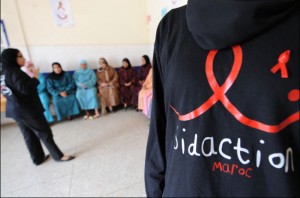By Siham Ali in Rabat
for Magharebia

A member of the Association for the Prevention of AIDS (ALCS) talks to Moroccan women during a previous screening for HIV in Mohammedia near Casablanca
The goal of Sidaction 2014 is to encourage young people in Morocco to get tested for HIV.
Young people are at the heart of the AIDS awareness campaign running December 1st – 24th in Morocco.
That focus is justified by the fact that 51% of the 31,000 people living with HIV or AIDS in Morocco are aged between 15 and 34, according to the Association for the Prevention of AIDS (ALCS). Young people comprise more than 30% of the population.
Roughly 80% of the young people who are infected are unaware of their HIV status. Some 60% of people living with HIV or AIDS enter the treatment system only in the later stages of the disease. Every year, there are nearly 3,100 new infections, and 1,400 deaths linked to the virus.
The Sidaction 2014 campaign is aimed at encouraging young people to go for screening.
Professor Hakima Himmich, the ALCS president, says that young people represent Morocco’s future, and that it is therefore important to remain on course for an AIDS-free generation.
Sociologist Karim Touhami welcomes the contribution made by civil society to raising awareness of the disease. Targeting young people is sensible in more than one respect, he says.
“A great many of them don’t know how it is transmitted and how to minimise the risks; others, because they’re afraid of taking the plunge and getting tested, cut themselves off and don’t get medical advice, even though it’s been proven that early care will enable someone who’s carrying the virus not to pass it on,” he says.
In addition to raising awareness, the campaign will collect funds that will be used to care for people living with the disease.
“Our fundraising will enable us to develop and step up our work directly, and will therefore help us to fight this disease,” Himmich says.
Her association is working hard to provide medical and psychosocial care for people living with HIV or AIDS. Local prevention and awareness campaigns are taking place among key sectors of the population – lorry drivers, labourers, men engaging in sexual relations with other men and sex workers, migrants, drug users and young people – as well as the general public.
Hakima, 46, is one of those receiving care. She contracted HIV from her husband, who died 10 years ago. She tells Magharebia she did not know she was infected with the virus until her husband died.
“His doctor advised me to have a test. And that’s when I discovered the catastrophic news. My family turned their backs on me, and no one wanted to sit at the same table with me anymore. I had to move to another town so that I could live on my own, away from the judgmental attitudes of my family and neighbours,” she says bitterly.
Ahmed, 34, also moved after he contracted the virus three years ago.
“Fortunately, I had a test early on. It’s not the family that’s eating me up; it’s the looks I get from my family and friends that haunt me. I can’t live among them. I’ve had to go far away, where no one knows what’s going on,” he says with tears in his eyes.
The awareness campaign is also aimed at removing the stigma for people living with HIV or AIDS. Indeed, there is still a lot of prejudice in Morocco over the way the virus is spread.
“People who test positive are systematically accused of living a debauched lifestyle and people are afraid of approaching them,” Touhami says. “It’s high time Moroccans became aware of the different ways in which the virus is transmitted, to avoid stigmatisation.”




